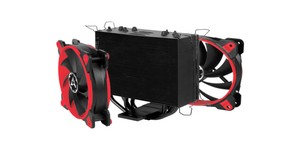Spider silk could lead to more efficient heatsinks
March 7, 2012 | 11:10
Companies: #iowa-state-university

An engineer at Iowa State University has made a discovery that could lead to improved flexible electronic components: that spider silk conducts heat as effectively as metal.
Revealed in the journal Advanced Materials, associate professor of mechanical engineering Xinwei Wang's discovery came as he looked for organic materials as effective at the transfer of heat as copper, aluminium and diamonds. While some had speculated on the potential of spider silk in such an application, it had never been experimentally tested.
Along with researchers Xiaopeng Huang and Guoqing Liu, plus funding from the Army Research Office and the National Science Foundation, Wang was able to test the web of golden silk orbweaver spiders (Nephila clavipes) for thermal conductivity. The results were surprising: the draglines used to anchor the spider webs in place conduct heat better than most other materials, including aluminium, silicon and pure iron.
According to Wang's experiments, the spider silk tested at a heat conductivity rate of 416W per metre Kelvin. In contrast, copper - a common material for heatsinks - measured at 401W per metre Kelvin. Traditional silks, such as that of the common silkworm, conduct at a mere 0.4W per metre Kelvin, while human skin manages 0.6W per metre Kelvin.
'This is very surprising because spider silk is organic material,' Wang explains of his discovery. 'For organic material, this is the highest ever. There are only a few materials higher - silver and diamond. I think we tried the right material.'
The spider silk has another interesting property: its thermal conductivity increases when stretched. According to Wang's testing, stretching the spider silk to its 20 per cent limit increased thermal conductivity by the same value, contrasted with typical materials which become less efficient conductors as they stretch.
It's this property which could lead to spider silk becoming a key component of flexible electronics, as used in wearable computing devices and prototype folding displays.
Wang's research could also, theoretically, lead to a modified form of spider silk being used as a thermal transfer material in computers. Instead of the typical copper or aluminium base on a heatsink, a sheet of stretched spider silk would provide increased thermal transfer and better overall cooling performance.
Wang is being careful not to suggest that his research is ready for commercialisation, but claims that the preliminary results are promising. 'I've been doing thermal transport for many years, he explains. 'This is the most exciting thing, what I'm doing right now.'
Revealed in the journal Advanced Materials, associate professor of mechanical engineering Xinwei Wang's discovery came as he looked for organic materials as effective at the transfer of heat as copper, aluminium and diamonds. While some had speculated on the potential of spider silk in such an application, it had never been experimentally tested.
Along with researchers Xiaopeng Huang and Guoqing Liu, plus funding from the Army Research Office and the National Science Foundation, Wang was able to test the web of golden silk orbweaver spiders (Nephila clavipes) for thermal conductivity. The results were surprising: the draglines used to anchor the spider webs in place conduct heat better than most other materials, including aluminium, silicon and pure iron.
According to Wang's experiments, the spider silk tested at a heat conductivity rate of 416W per metre Kelvin. In contrast, copper - a common material for heatsinks - measured at 401W per metre Kelvin. Traditional silks, such as that of the common silkworm, conduct at a mere 0.4W per metre Kelvin, while human skin manages 0.6W per metre Kelvin.
'This is very surprising because spider silk is organic material,' Wang explains of his discovery. 'For organic material, this is the highest ever. There are only a few materials higher - silver and diamond. I think we tried the right material.'
The spider silk has another interesting property: its thermal conductivity increases when stretched. According to Wang's testing, stretching the spider silk to its 20 per cent limit increased thermal conductivity by the same value, contrasted with typical materials which become less efficient conductors as they stretch.
It's this property which could lead to spider silk becoming a key component of flexible electronics, as used in wearable computing devices and prototype folding displays.
Wang's research could also, theoretically, lead to a modified form of spider silk being used as a thermal transfer material in computers. Instead of the typical copper or aluminium base on a heatsink, a sheet of stretched spider silk would provide increased thermal transfer and better overall cooling performance.
Wang is being careful not to suggest that his research is ready for commercialisation, but claims that the preliminary results are promising. 'I've been doing thermal transport for many years, he explains. 'This is the most exciting thing, what I'm doing right now.'

MSI MPG Velox 100R Chassis Review
October 14 2021 | 15:04








Want to comment? Please log in.